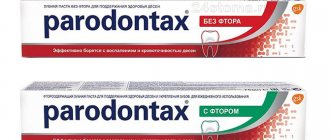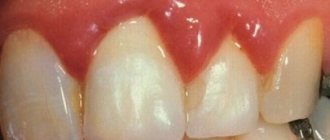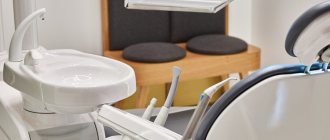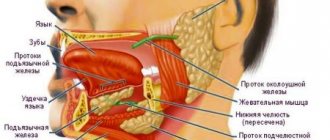Author of the article:
Soldatova Lyudmila Nikolaevna
Candidate of Medical Sciences, Professor of the Department of Clinical Dentistry of the St. Petersburg Medical and Social Institute, Chief Physician of the Alfa-Dent Dental Clinic, St. Petersburg
Periodontal disease is one of the most dangerous and insidious dental diseases, which can lead to the complete loss of not only single teeth, but also entire dentitions. Periodontal disease practically does not affect the teeth themselves, however, under its influence, periodontal tissue is destroyed - that part of the gum and jaw that is in direct contact with the root of the tooth and ensures its fixation. Not only the soft tissue of the gums weakens and collapses, but also the bone tissue, as a result of which the teeth become loose and there is a threat of their complete loss.
Degenerative processes in gum tissue that occur during periodontal disease develop under the influence of a number of factors, none of which researchers single out as the main and only one. Patients suffering from periodontal disease almost always exhibit certain trophic and circulatory disorders in the gum tissue, in particular of an atherosclerotic nature. However, such disorders can arise as a consequence of a wide variety of pathologies. Among the reasons that can provoke the occurrence of periodontal disease, experts name various dysfunctions of the endocrine and digestive systems, vascular diseases, neurological diseases and occlusion pathologies, single or regularly recurring injuries. Bad habits (alcohol and tobacco consumption), poor nutrition, which causes a lack of vitamins and minerals, and a persistent decrease in immunity, leading to increased activity of pathogenic and opportunistic microorganisms in the oral cavity, play a role in this process.
Unfortunately, today there is not a single drug that could completely restore destroyed tissue and reverse the process of development of periodontal disease. However, the use of a complex of physiotherapy and medications makes it possible to stop the progression of the disease, stabilize the patient’s condition and help the body regenerate damaged periodontal tissue. The leading role in achieving this result belongs to medications. You will learn about how to treat periodontal disease with medication from our material.
How to cure periodontal disease forever?
Treatment of any disease begins with diagnosis. In the case of periodontal disease, which is often asymptomatic, the following procedures are performed to make a final diagnosis:
- examination of the oral cavity;
- probing of the gingival sulcus;
- X-ray examination (orthopantomography);
- biomicroscopy of the gums to determine the degree of microcirculation impairment.
The main factor confirming the presence of periodontal disease is a uniform decrease in the height of the interdental septa with alternating foci of osteosclerosis and osteoporosis in the deep parts of the alveolar process and the body of the jaw, as well as in other bones of the skeleton. As a rule, all these manifestations are displayed on an x-ray. The patient will also need additional consultation with a general practitioner and an endocrinologist to identify and treat metabolic disorders, diseases of the cardiovascular or endocrine systems, which often accompany the disease.
How to get rid of periodontal disease and finally prevent bone tissue destruction? Unfortunately, it is impossible to completely say goodbye to the disease. For this reason, treatment of dental periodontal disease is usually aimed at slowing down the process of periodontal dystrophy and preventing tooth loss, tissue inflammation and purulent bone damage.
Consequences of periodontal disease - why is it dangerous?
- Firstly, due to the absence of pronounced symptoms, this disease can progress unnoticed over many years and lead to total destruction of the teeth and jawbone - and then teeth fall out with periodontal disease.
- Secondly, the destruction of bone tissue leads to disturbances in the functioning of the gastrointestinal tract with the subsequent occurrence of diseases of the digestive system.
- Thirdly, advanced periodontal disease can provoke periodontitis - acute inflammation of the tissue and tooth loss.
In addition to the above consequences, generalized periodontal disease in an advanced stage causes another dangerous disease - osteomyelitis, that is, purulent bone damage.
Treatment methods for periodontal disease
The development of the disease can be slowed down by treating periodontal disease with medications and carrying out the following procedures:
- professional hygiene for timely removal of dental plaque;
- splinting to normalize occlusal relationships;
- the use of drugs for periodontal disease, vitamins and agents to improve microcirculation in tissues (nicotinic acid, aloe extract, heparin);
- massage to strengthen gums during periodontal disease;
- grinding of teeth;
- prosthetics;
- darsonvalization of gums;
- filling erosions.
Modern methods
The most effective treatment for periodontal disease is based on the use of more modern methods, listed below:
- exposure to high pressure oxygen in hyperbaric chambers;
- ultrasonic device for the treatment of periodontal disease;
- local hypo- and hyperthermia;
- diadynamic currents;
- amplipulse therapy;
- electrophoresis;
- UHF therapy.
Which doctor treats periodontal disease? Most patients do not know the answer to this question. A doctor who treats periodontal disease is called a periodontist. Be sure to contact this specialist if you notice pale coloration and receding gums, increased tooth sensitivity, or a wedge-shaped defect. Where to treat periodontal disease? Of course, in a dental clinic.
Causes of periodontal disease in adults
Periodontal disease is a systemic disease that indicates not so much problems in the oral cavity, but rather malfunctions in the functioning of various organs. In most cases, pathology develops due to poor circulation in the gums. This is due to age-related changes, deterioration of immunity or certain diseases: diabetes, atherosclerosis, malfunction of the endocrine system, etc.
Surgical treatment of periodontal disease
Is it possible to cure advanced periodontal disease? The answer to the question is also negative. However, when treating advanced periodontal disease, surgical intervention is most appropriate. We are talking about the stage of the disease when the alveolar process is almost completely atrophied, and in order to prevent the loss of all teeth, the patient undergoes an operation to restore bone tissue during periodontal disease, which will keep the teeth in their places.
What is occlusal injury
Occlusal trauma is when a tooth experiences excessive stress due to:
- the tooth is not in the dentition,
- the tooth is not in the correct position,
- the tooth has not grown physiologically,
- the tooth is tilted, at the wrong angle.
The occlusion of the teeth is impaired. That is, when chewing in a patient with impaired occlusion, a destructive force of chewing pressure is created, and the bone tissue in the area of these above teeth begins to decrease.
What is chewing from a physiological point of view?
It's teeth hitting teeth. The strongest blow, since the masticatory muscles are the strongest in the body.
In simple words, in a patient, from such a hyper-impact, hyper-contraction of the masticatory muscles, which develops during chewing, from this beating of teeth against each other, the bone begins to contract. Bone tissue shrinks. And after the bone, the gum also contracts, because the bone and gum are tightly connected. The gum descends, following the bone. And here we answered the main question - why gums recede.
Let's now begin to form an understanding of the answer to the next question: what to do if your gums have receded.
Remedies for periodontal disease
There is no best cure for periodontal disease, and a specific cure has not yet been invented. At the moment, relief from the symptoms of this disease is achieved only through special procedures and complex treatment of periodontal disease with drugs rich in amino acids, proteins and antioxidants. Taking vitamins for periodontal disease also helps accelerate metabolism in periodontal tissues. What vitamins can a doctor prescribe? Typically, as part of drug treatment for periodontal disease, dentists recommend taking the following vitamins and minerals:
- vitamin B6 and vitamin B12 – if periodontal disease develops against the background of pathologies of the digestive system, diabetes mellitus, neurasthenia;
- folic acid – to activate all metabolic processes in the body;
- zinc – for bone tissue regeneration;
- calcium – for mineralization of bones and teeth;
- selenium - for antioxidant and immunomodulatory effects.
You should not self-medicate. The doctor determines which drugs for periodontal disease should be used in each specific case, based on the results of dental diagnostics and the general condition of the patient’s body.
Remedies for reducing tooth sensitivity
Due to the exposure of the necks and roots, the teeth of patients with periodontal disease become much more sensitive to the effects of various irritants - thermal, chemical, mechanical. Patients experience significant discomfort when eating spicy or sour foods, drinking hot or cold foods and drinks. To eliminate this unpleasant symptom, various means are used, including calcium gluconate, which is administered by electrophoresis (medicine applications combined with a weak electric current).
To combat hyperesthesia and eliminate other symptoms, you can also use special toothpastes. In particular, the minerals potassium citrate and hydroxyapatite, as well as thermal mud, which are contained in ASEPTA Sensitive toothpaste for sensitive teeth, help reduce tooth sensitivity and strengthen enamel. It also contains extracts of medicinal plants that have anti-inflammatory and antimicrobial effects.
Antibiotics for periodontal disease
Patients are often interested in whether antibiotics are used for periodontal disease in adults? In the initial stages, this is not necessary, since there is no inflammatory process. However, severe degrees of the disease are sometimes accompanied by inflammatory complications. Here, treatment of periodontal disease with antibiotics is considered justified. What antibiotics do doctors usually prescribe for periodontal disease with inflammatory complications? These can be various drugs that help quickly stop inflammation.
Stages of disease development
There are 3 stages of periodontal disease:
- Easy.
The patient has no complaints; very rarely there is a reaction to cold or hot food. The presence of periodontal disease can be determined during a dental examination. The mild stage of the disease is best treated.
- Average.
The roots of the teeth are exposed by an average of 4-6 mm. The patient begins to experience a burning sensation in the mouth, and there is an acute reaction to eating hot, cold or sour foods.
- Heavy.
The roots of the teeth are exposed by 8-10 mm. Chewing food causes severe pain.
Injections into the gums for periodontal disease
In addition to drug treatment, injections for periodontal disease are also used. These are injections of aloe extract, which is an effective biogenic stimulant. Typically, the course of treatment consists of 20 - 25 injections with a break per day. What injections for periodontal disease are prescribed if the disease has become severe? In the presence of an inflammatory process in the later stages of the disease, dental periodontal disease can be treated with injections with synthetic tissue regeneration stimulators according to the same scheme.
Gum diseases: causes
Factors that increase the risk of developing gingivitis:
- Insufficient oral hygiene.
- Hormonal changes in the body. They create a favorable environment for the formation of inflammatory processes in the oral cavity. That is why teenagers and pregnant women most often suffer from gingivitis.
- Damage from impacts, burns, incorrectly installed fillings and dentures.
Periodontitis occurs if gingivitis is not properly treated in time. The inflammatory process, under the destructive influence of pathogenic bacteria, spreads to other areas of the periodontium.
Periodontal disease develops due to poor blood supply to the gums and poor nutrition. The most common causes of periodontal disease:
- gastrointestinal diseases,
- diabetes,
- heart and vascular diseases,
- taking anticonvulsants and other medications that reduce salivation.
The problem may also be hereditary.
Plates for periodontal disease
Often solutions and ointments for the treatment of periodontal diseases are not effective enough, as they are quickly removed from the mouth with saliva. Therefore, it is necessary to apply products in the form of applications for periodontal disease. However, modern treatment of periodontal disease involves the use of an alternative form of drugs that allows active substances to better penetrate the epithelium to achieve a high regenerative effect. These are plates made from natural polymers (gelatin, collagen, sodium alginate) and medicinal substances that improve metabolic processes in tissues and increase vascular tone (mineral components, enzymes, herbs, vitamins, amino acids, organic acids, phytohormones).
How is periodontal disease treated with plates?
The product is applied to the gingival margin after brushing the teeth and gently pressed into the interdental spaces. Thanks to their adhesive properties, the plates can be held on the gums for 6 to 10 hours. Then their remains are removed with warm water.
The instructions for these plates say that they are intended to protect and improve periodontal tissue. But is it possible to cure advanced periodontal disease with their help? The answer is negative. This product is not intended specifically for the treatment of periodontal disease. It has a general strengthening effect on the entire periodontium as a whole and is more suitable for alleviating the symptoms of gingivitis and periodontitis in the form of bleeding and inflammation of the gums.
The next stage is the removal of dental plaque above and below the gums.
The main cause of the inflammatory process during periodontal disease is the presence of a large amount of plaque. Its formation is a consequence of insufficient oral care. Therefore, it is impossible to achieve effective treatment unless the root cause is removed. The optimal way to treat tartar and plaque in modern dentistry is the use of ultrasound.
The next stage of eliminating periodontal disease is therapy aimed at relieving inflammation. As a rule, it lasts about 10 days.
The course consists of rinsing the mouth for an antiseptic effect.
Algorithm:
- After breakfast, brush your teeth thoroughly for 3-6 minutes.
- Rinse mouth with chlorexidine (0.05%).
- Dry the gums using a clean cotton swab.
- Apply a special gel to the gums.
- Do not eat for at least 2 hours, drink only clean water.
Such step-by-step treatment is prescribed for mild cases of the disease. If the development of periodontal disease has reached its climax, you will need to take antibiotics (7-10 days). The doctor may prescribe tablets or intramuscular injections.
How to treat periodontal disease with folk remedies?
Treatment of dental periodontal disease with folk remedies will not bring results. No rinses or decoctions can cope with bone tissue degeneration. And following advice from articles on the Internet that recommend using hydrogen peroxide or other chemicals to eliminate periodontal disease is not only pointless, but also dangerous to your health. It is important to understand in time that this is a serious disease that requires qualified assistance from a periodontist, and to seek treatment for periodontal disease at the dentist.
Possible complications
If you ignore the symptoms of periodontal disease for too long and do not take measures to solve this problem, the disease can lead to very disastrous consequences. Pathology leads not only to aesthetic problems, but also to the complete impossibility of carrying out hygienic procedures, and nutritional problems (due to pain that occurs when mechanical action is applied to exposed roots).
An advanced form of the disease can even lead to tooth loss. Atrophic processes and destruction of the ligamentous apparatus deprive the teeth of natural support. As a result, they become very loose and fall out. To prevent such an outcome, it is important to promptly seek professional help from a specialist.
Prevention of periodontal disease
There are few preventive measures to prevent the appearance and development of periodontal disease, since the pathology is associated with genetic predisposition and metabolic disorders in the body. In general, doctors recommend maintaining overall oral hygiene through regular brushing and flossing.
You should also follow a certain diet for periodontal disease and to prevent the disease. It is recommended to eat more milk, vegetables, seafood, unrefined vegetable oils, and limit carbohydrate intake. The diet for the prevention and treatment of periodontal disease in adults should include a sufficient amount of raw vegetables and fruits, which promote self-cleaning of teeth from plaque and have a massaging effect on the gums, improving their microcirculation.
What does splinting teeth do?
When mobility occurs, it is important to connect stable and mobile teeth into a single system. The lateral and anterior teeth are splinted separately. A groove is cut on the chewing surface of the teeth into which a splint - a fiberglass thread - is placed.
The front teeth are splinted using a method similar to fixing the bite after wearing braces.
Splints allow you to feel more confident about your teeth while eating.
Splinting teeth makes it difficult to maintain interdental hygiene. Instead of dental floss, you will need dental brushes, it is advisable to use an irrigator and resort to professional hygiene more often.
Read the article To prevent periodontitis, do professional hygienic teeth cleaning 2 times a year.
If you pay due attention to your teeth, the condition of your gums and the general health of your body, then with a diagnosis of periodontitis or periodontal disease, you can save your teeth for many years.










